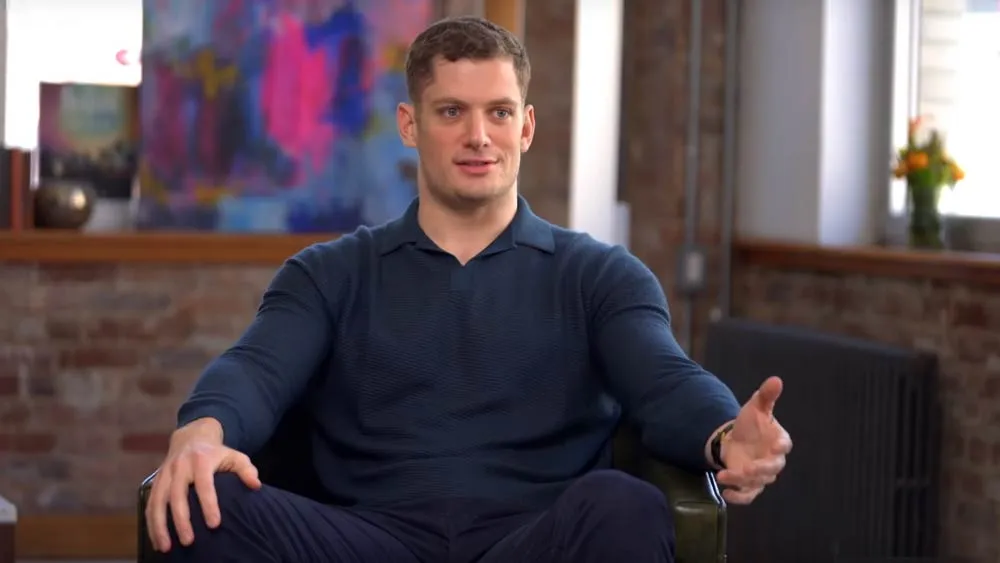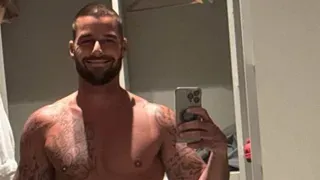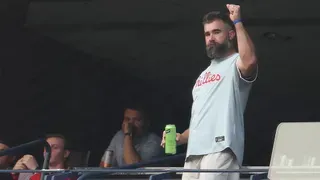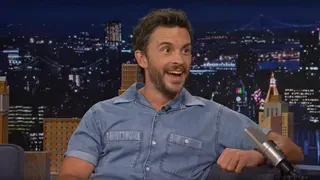December 29, 2015
Steve Grand :: An All-American Boy for Today
Frank J. Avella READ TIME: 10 MIN.
I happened to watch ABC's country music drama "Nashville" the night after an enlightening conversation with openly gay recording artist Steve Grand. And so I couldn't help but uncontrollably giggle at a telling moment on the show involving the now out but deeply tormented singer-songwriter Will Lexington (Chris Carmack). In the sequence, Will is performing in a smallish club (because his label dropped him for being gay), happily crooning to a bevy of adoring female fans, when a gay guy suddenly is pushed toward the front of the stage. Will is so distraught that he finishes the song with his back to the crowd. And the poor gay boy -- you see the disgust on his clich�d face. ("Nashville" is somewhere in 2005 when it comes to showcasing real LGBT characters.)
What made me tee-hee was thinking about how Steve Grand would have handled the situation. First, he would have probably delighted in it by not only singing directly to the fan, gyrating all over him, but also pulling the dude onstage to make him feel like he mattered.
Steve Grand garnered nationwide attention in the summer of 2013 when the video for his self-produced and financed unrequited gay crush anthem, "All-American Boy," went viral on YouTube. Soon after, he was called the "first openly gay male country star" by BuzzFeed, which spiraled the artist into a whirlwind of instant fame, social media scrutiny and fan expeThis text will be the linkctation. It didn't hurt that sexy photos of the singer circulated.
Two years later Grand finally released his full-length album, "All-American Boy," and in that time he received a speedy education on the difficulties of creating art while in the spotlight and learning to maneuver the often mean-spirited arenas of social media and the Internet.
I spoke with Grand for a spell right before he was about to hit the gym and then attend a recording session in Los Angeles. He opened up about himself and the many false assumptions made about him and provided insight into what it's like navigating a bourgeoning career while under a 24/7 microscope.
First, he addressed the country artist label conundrum. "I suppose that there are things in my music sonically and some things I sing about lyrically that make people think and hear country, and that's fine with me. I don't call myself a country artist, but I'm not bothered if people do... I look at myself as a singer-songwriter," he says. "Frankly, I've always been confused by why it's so important for people to know how to categorize something. That's never been important to me. I think labels are helpful and meaningful, but outside of being able to generally classify something, I don't really find them useful."
For Grand, we are more than just the labels attached to us.
"I just try to be the best me that I can be, and if people find that inspiring because I'm unapologetically who I am, then I think that's great," he continues. "I think that's generally a good template to live by: to be yourself, to be free to be open and honest about who you are. But at the same time it's really important to remember that knowing who you are is a process that has no end. It's just something we always need to be striving for, to be better human beings, but it's not necessarily a point of arrival."
Steve Grand, the work in progress, got off to an encouraging start creatively but a bumpy one when it came to his sexuality.
"I grew up in the suburbs of Chicago in a Polish-Catholic home, in a Polish-Catholic community," he shared. "I've always been very creative, and my parents did a really good job of allowing me to explore all sorts of creative pursuits. By the age of 13 I started writing music, and I was playing guitar. But that's when things got difficult for me. I think that's the age when things get difficult for a lot of young people. That's when I realized I was gay, and that caused a lot of difficulties because of the community I was a part of and because of our faith. There was a lot to reconcile there. My parents weren't OK with it for a long time. Neither was I. Accepting myself was definitely the biggest battle. And it took years for me to do it and, once I did, they were able to." (Grand says his parents fully accept him now.)
It was at a Boy Scout summer camp that young Steve became aware of his attraction to guys. "There was this camp counselor that I always wanted to be around... and when we left, I was really upset, and I could see that he wasn't nearly as upset as I was, and that really confused me. Why did I feel this way about this other guy?... And on the ride back it occurred to me that what I was feeling was love -- a 13-year-old version of it. I was like, Holy shit -- I like this guy like a boyfriend. It was awful. It was an awful thing to realize."
His parents sent him to a Christian therapist, a fact that the media has distorted, with some outlets erroneously alleging he underwent conversion therapy. Looking back, Grand speaks frankly about his therapist and the paradoxical experience. "It was such a low point in my life and such an important part of my life. I'm the person I am today partly because of that," he explains. "It was a significant experience. This was someone I was seeing every week, and it was a really complicated dynamic. It wasn't all good and it wasn't all bad. It definitely harmed me in some ways in that my sexuality, at a time when it really needed it to be affirmed, wasn't being affirmed. However, it was really good to have someone to talk to that I felt like I could be honest with, someone that wasn't judging me. While he [the therapist] still believed that God didn't make me gay, I didn't feel judgment from him, which was an unusual thing in my life. It's strange that the first time I encountered not feeling judged was by my Christian therapist, who believed that God did not make me gay."
He continues: "I've gotten some flack for not talking about it in the right way, but I'm going to be honest about my experience. It wasn't conversion therapy. Conversion therapy is horrible... I'm obviously against telling a young gay person that [being gay] isn't really their true sexuality. But I have my own experiences, and I'm going to stay true to them."
Music was a potent part of helping Grand understand himself. "I felt really misunderstood and very frustrated. I felt like I was feeling something that I didn't know how to express, and I took it upon myself to try and learn to express myself through music and words. And that was therapeutic for me in some ways."
Grand left home at 18 to attend Belmont University in Nashville. A year later he enrolled at the University of Illinois. He supported himself by playing piano gigs at a local club called the Joint in downtown Chicago. It was during that time that "Steve Starchild" was born. "It was a YouTube name," he confesses. "I was concerned with using my real name. What if I end up working in the corporate world? I'm not going to want everything I did in my youth coming up. I thought that was actually cool. It's part of my history."
Another messy piece of Grand's bio involves his "modeling days." Beyond the shirtless selfies he enjoys posting, he admits, "I was never a real model. I had professional shots taken, but I was never paid for any of it. Those pics have been out there since I was 19 and was from a handful of photo shoots. I was thinking about getting into it, but then I changed my mind. I wanted to focus on music."
And focus on the music he did. At 23, it all paid off with "All-American Boy." "I made it with the idea that it was something that had viral video quality," he shares. "But I did not expect it to be the thing that single-handedly would start my career. I thought it might help get the ball rolling, but it was really like such a catalyst in so many ways. And it's still the most impactful thing I've done so far."
Building on the momentum was a challenge for the budding artist. "I wasn't ready for any it. I spent my whole life thinking about how I was going to get 'discovered.' All my energy had been put into making that moment happen, but it never occurred to me to figure out what I was going to do when it did happen."
The attention showered on Grand proved a mixed blessing: On one hand, his music was getting a lot of attention; on the other, some outlets merely portrayed him as a sex object. "I think the work at the end of the day speaks for itself. We're biologically programmed to want sex, to look at sexual imagery. Yes, sometimes it overshadows what you're doing and what message you're trying to get across, but that's all a part of it. If you are a good-looking person, there are a lot of benefits to that in pretty much any industry, especially the entertainment industry. It's a double-edged sword for sure, but it probably does more good than harm."
It's taken time for Grand to grapple with the extremes that go along with being a public figure in the age of social media. "Criticism is good," he explains. "We need rigorous criticism in our society -- but that is different than straight-out slander. And people seem to not always understand the difference between being critical and raking someone over the coals. I've seen a lot of valid criticisms of my work and of me as a person, and I've also seen people be downright mean. I guess the best thing that you can do is laugh at it all -- take things less seriously...It's especially important when you have an online presence and people can fire away at you...They're not really seeing you as a three-dimensional person. They're seeing you as this flat, two-dimensional representation of something."
On past squabbles, Grand offers, "I'm not proud of the way I've handled some things. I'm not proud of the few times I've engaged people who are clearly trolling, who don't deserve my energy. So I've had to get mad at myself and wonder why are you giving these people power. Anyone who would say ridiculous and hurtful things just to get a reaction is not worthy of your time and consideration and thought. Those are things I had to learn pretty quickly. It's important for all of us to learn -- especially young people -- because it's the world that we live in and, unfortunately, there are a lot of angry people out there who have nothing to lose and just want to take shots at everyone."
Despite the negative aspects of his celebrity, the immense popularity of Grand and his music was confirmed by the Kickstarter campaign he began to fund his debut album. His original goal was $81,000, but he raised a whopping $326,593.
The campaign enabled Grand to put together a crackerjack team to record the gay-empowering album "All-American Boy," on which most of the tracks are about a guy loving other guys. The title was well-thought-out: "I want to include gay people in this idea of what it means to be all-American. It was symbolic of my reclaiming that identity for myself. I did it also to encourage my fans to do the same. Whatever way you identity yourself, whatever identity you want to create for yourself, it's yours for the taking -- it's yours for the creating. And nothing should keep you from being who you want to be."
The work boasts 13 tracks about love and lust and rebellion, as well as unrequited love. Oh, and booze. Whiskey in particular. With his personal expression, Grand is tapping into the feelings of many gay youth living in small-town America. "I lived a very sheltered life because my parents were old-fashioned," he says. "And so I feel like I connect with people who grew up in small towns a little more."
New recordings are on the horizon for Grand, as well as a possible foray into acting. "I'm working on that right now," he enthuses. "I'm actually taking some classes. I want to be good at it. I've been asked to audition for roles. It's something I've always wanted to do. Right now I'm just studying up and honing my chops. I only want to do it if I'm going to be really great at it."
And where does he see himself in 10 years?
"I want to have found someone, to be building a life together with someone," he replies. "I hope music is always in my life. I hope that I'm working hard and being passionate about whatever I'm doing. I hope that I'm not living with a lot of regrets. I just want to be content and settled. Most of my life I've been in this pursuit of achievement and being someone... I just want to be happy, and I want to have a family, and I want to have joy in my life, and I want to be able to make art. And I want to have good people around me."
As far as the biggest misconception about him: "Some people might think I'm more of a meathead than I am -- and through no fault of their own. My social media is pretty light and silly. So it's easy for people to just look at me and not see anything beyond the surface...I think so many things feel contradictory about me, and people get confused because to some people, I have this wholesome image and vibe, like with church -- but I'm actually not religious at all. I'm very much an atheist. I believe in rigorously critical thinking. I believe in reason above all else."
On his approach to his ever-growing celebrity and what he puts out into the cloud and beyond, he says, "I'm still trying to figure out what I am and, more importantly, what I can be...You really either have to go all in and be so incredibly honest or you just have to be really calculating. It's hard to mix both. And so I think I'm going to be someone who is unpolished and raw, and I'm probably going to piss off a lot of people, because I'm going to say something that makes for a crappy sound bite taken out of context. But you know what? I can't micromanage anymore. I'm done with that. If I have to do that, it's just not worth it to me, so I'm just going to be myself."
Now if only we could get the creatives on Nashville to wake up to what a real gay (semi-) country artist is all about. Take a page from the life of Steve Grand. Or just cast the dude in a role on the series and let his veracious, unashamed songs speak for themselves!
Download tracks and view videos at stevegrand.com
Frank J. Avella is a proud EDGE and Awards Daily contributor. He serves as the GALECA Industry Liaison and is a Member of the New York Film Critics Online. His award-winning short film, FIG JAM, has shown in Festivals worldwide (figjamfilm.com). Frank's screenplays have won numerous awards in 17 countries. Recently produced plays include LURED & VATICAL FALLS, both O'Neill semifinalists. He is currently working on a highly personal project, FROCI, about the queer Italian/Italian-American experience. He is a proud member of the Dramatists Guild. https://filmfreeway.com/FrankAvella https://muckrack.com/fjaklute





